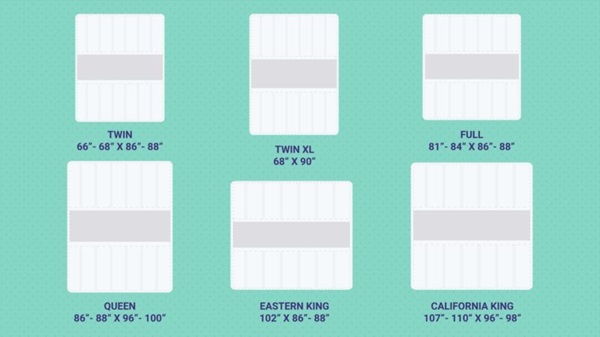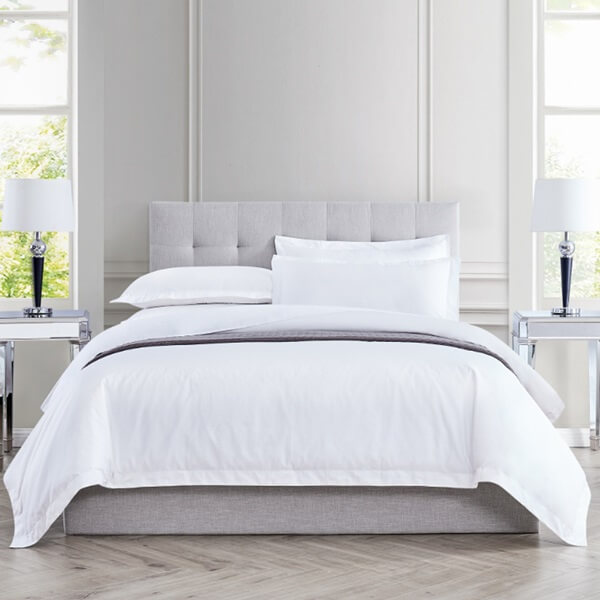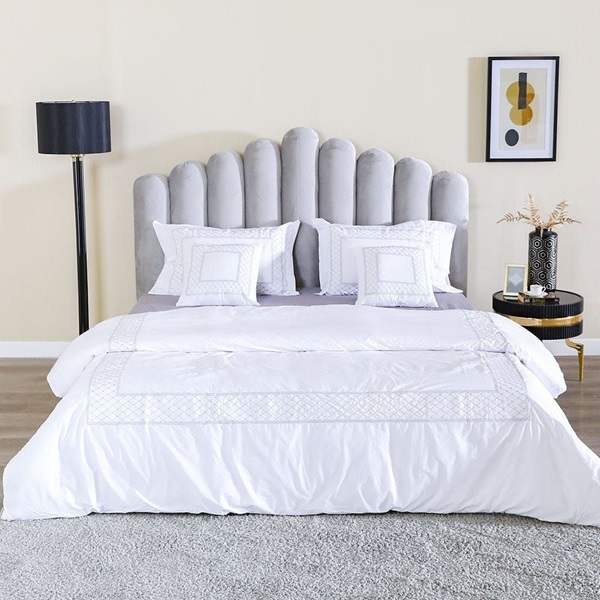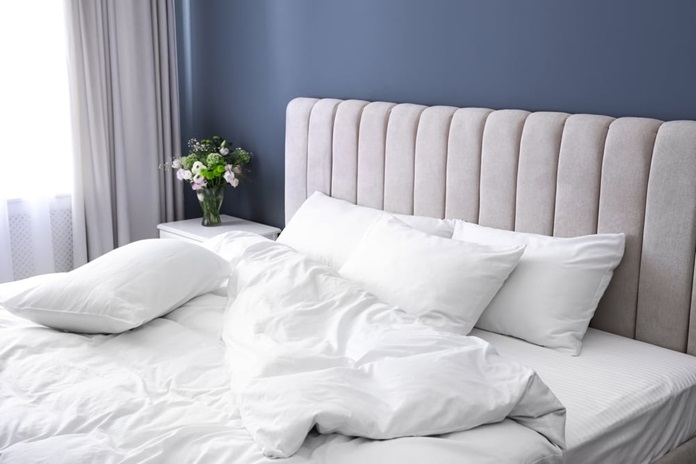A comforter, like a thick, padded blanket, can keep you warm all night. But picking the right one can be tough. Unlike mattresses that come in standard sizes, comforters can differ in size depending on the brand, with varying lengths and widths. So, it’s best to check the actual measurements of a comforter, not just the size on the label.
In this post, we will go over the usual comforter sizes, how to pick the right size for your mattress, and tips for measuring your bed correctly.
Understanding Oversized Comforter
An oversized comforter provides extra width without adding extra length. These comforters are great for thick mattresses, especially those with pillow tops or extra comfort layers.
Mattresses like these need more material according to their width as they are thick. An oversized queen comforter is typically around 115 inches wide, compared to a standard queen comforter which is usually 86 to 88 inches wide.
How to Pick the Right Size Comforter
Picking the right comforter can be easy, even with the different sizes available. By following a few simple steps, such as measuring your mattress and considering the height of your bed frame, you can find the perfect comforter size for you.
Also read, What Is A Split King: Customizable Sleep Solution
Steps to Measure Your Mattress
The first step in finding the right comforter size for your bed is to measure your mattress. While mattress lengths and widths are standard, thickness can differ.
Pillow-top mattresses and those with extra comfort layers are usually thicker. These thicker mattresses need wider comforters so the sides hang down properly.
To measure your mattress, add the width and the thickness on each side together. For example, if you have a queen-size mattress that is 60 inches wide and 12 inches thick, a properly fitting comforter should be at least 84 inches wide.

Measuring your mattress before you purchase a comforter will give you an idea of the dimensions to look for when shopping. A simple step like this will make sure you choose one that’s not too short or too long for your bed.
Moreover, measuring your mattress before buying a comforter will help you determine the dimensions to look for while shopping. This straightforward step ensures that you choose a comforter that fits your bed perfectly, avoiding one that’s too short or too long.
Comforter Sizes
There are no standard sizes for comforters, however, they generally come in common lengths and widths. The size chart below shows typical comforter measurements you might see while shopping for bedding.
| BED SIZE | MATTRESS DIMENSIONS | IDEAL COMFORTER WIDTH | IDEAL COMFORTER LENGTH |
|---|---|---|---|
| Twin | 38 inches by 75 inches | 66 to 68 inches | 86 to 88 inches |
| Twin XL | 38 inches by 80 inches | 68 inches | 90 inches |
| Full | 54 inches by 75 inches | 81 to 84 inches | 86 to 88 inches |
| Queen | 60 inches by 80 inches | 86 to 88 inches | 96 to 100 inches |
| Eastern King | 76 inches by 80 inches | 102 inches | 86 to 88 inches |
| California King | 72 inches by 84 inches | 107 to 110 inches | 96 to 98 inches |
Consider the Height of Your Bed Frame
Just like the thickness of your mattress, the height of your bed frame and overall bed height can affect how a comforter drapes over the sides.
If your bed frame is very tall or very short, you should consider this when measuring your mattress and picking the right comforter size.
Similarly, Extra-high bed frames need wider comforters, or else they might fall short on the sides.
For shorter bed frames, you might find that your comforter is too long and drapes onto the floor, which might look like a bed skirt to some people.
Drape Lengths
How low you want your comforter to hang is mostly up to you, but most people prefer a comforter that covers their bed frame but does not drag on the floor. If you have a box spring or mattress foundation with a bed skirt, aim to keep one-third to one-half of the skirt visible for a neat apperance.
Difference Between Duvet Covers and a Comforter
Duvets and comforters are both filled with material like down, feathers, or synthetic fibers to make them soft and fluffy. Duvets are usually more filled and fluffier, so they are better for keeping warm.
Comforters are less fluffy and usually larger and lighter, so they drape over the bed more. You often use comforters with other blankets and sheets, while duvets are meant to be used by themselves with just a cover.

Many people prefer using a comforter over a duvet because comforters don’t need a separate cover. Duvets are made to fit inside a duvet cover, which can be removed and washed easily. However, putting the cover back on is like putting a large pillowcase on a pillow-it can be challenging.
To keep the duvet in place inside the cover, there are often clips of ties in the corners of the cover that attach to the duvet. This process can require patience since duvets and covers are large, and finding and attaching these ties can be bothersome for some people.
Are the sizes of full and queen comforters the same?
Some brands sell comforters labeled as “full/queen” even though full and queen mattresses are different sizes—54 by 75 inches for a full and 60 by 80 inches for a queen.
These full/queen comforters can vary in size from 81 to 88 inches wide and 86 to 100 inches long, which can cause them to fit poorly on either mattress size.

If you have a full-size bed, look for a comforter that is 81 to 84 inches wide and 86 to 88 inches long.
For a queen-size mattress, choose a comforter that is 86 to 88 inches wide and 96 to 100 inches long for the best fit.
What size king comforter should You get for a California king?
You should get a 107 to 110 inches wide, and 96 to 98 inches long king comforter which properly fits a California king bed. This size of king comforter will provide enough coverage for a Cal king size mattress which measures 72 inches wide and 84 inches long.
To make sure you get the right size comforter, you can measure your mattress. To find the best with for an oversized comforter, measure the width of your mattress and add the thickness of the mattress on both sides. This total will be the minimum width you need for the comforter.
Conclusion
In Conclusion, choosing the right comforter involves more than just picking a size off the label; it requires careful consideration of the actual measurements, especially given the variability across brands. This guide outlines the essential steps to ensure your comforter fits perfectly, from understanding oversized options to accurately measuring your mattress and bed frame. By paying attention to these details, you can avoid common pitfalls and select a comforter that offers optimal coverage and comfort for your specific bed size and style. Whether you prefer the convenience of a comforter or the luxurious feel of a duvet, taking the time to measure and choose wisely will enhance your sleeping experience.
Frequently Asked Question
Can I use a Full comforter on a Twin bed?
Yes, you can use a Full comforter on a Twin bed, but it will hang over the sides more. A Full comforter measures 76 x 86 inches, which is wider than a Twin comforter. This extra coverage can be a nice touch if you prefer a more draped look or if you have a thicker mattress.
Can I use a King comforter on a California King bed?
While you can use a King comforter on a California King bed, it may not offer full coverage due to the different dimensions. A California King comforter, which measures 104 x 100 inches, is designed to cover the larger size of the California King bed more effectively.
How does the height of my bed frame affect my comforter choice?
The height of your bed frame affects how the comforter drapes. Extra-high frames may require wider comforters, while shorter frames might result in comforters that drape onto the floor.
What is the difference between a duvet and a comforter?
Duvets are typically more filled and fluffier, providing better warmth. Comforters are larger and lighter, draping over the bed more easily. Duvets usually require a cover, while comforters do not.
Are “full/queen” comforters a good option?
“Full/queen” comforters can vary in size and might fit poorly on either mattress. It’s better to choose specific sizes for full (81-84 inches wide, 86-88 inches long) and queen (86-88 inches wide, 96-100 inches long) beds.
You may also like to read, Top 4 Best Mattresses Without Fiberglass for a Safe and Comfortable Sleep
